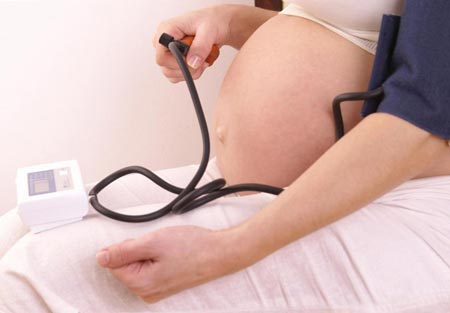Pregnancy often leads to the accumulation of excess fluid in the female body, often with the formation of edema. The withdrawal of fluid from the body of a pregnant woman can be facilitated by such a drug as.
Eufillin tablets during pregnancy
There are a lot of indications for the administration of aminophylline, but pregnant women are prescribed it mainly due to gestosis, the development of which worsens the blood flow in the organs. The consequences of the development of gestosis is the appearance of edema and increased pressure. In addition, protein may appear in the urine. After the use of aminophylline, the effects of gestosis are significantly reduced, and often completely eliminated.
In addition to gestosis, a woman during pregnancy may experience other problems that are associated with vasospasm. In most cases, the reception helps to get rid of such problems.
Side effects of aminophylline during pregnancy
It should be remembered that the use of aminophylline, and especially during pregnancy, should be done with extreme caution, because the drug has many contraindications. In addition, a number of side effects may occur.
Not often enough, but the use of aminophylline can still cause:
- noticeable decrease in pressure,
- headache,
- diarrhea or vomiting
- dizziness and discoordination of movements,
- tremor,
- sleep disturbances and insomnia.
Various allergic reactions (rash, fever, itching, etc.) are also possible.
The instructions for the drug clearly indicate that pregnancy is a contraindication for its use, therefore, a clear order of its use in this condition simply does not exist. The attending physician determines the need for his appointment specifically for each case. He selects the dosage and duration of the course of treatment.
Eufillin intravenously during pregnancy
Usually, use by pregnant women is carried out only in stationary conditions. In this case, the course of treatment is prescribed extremely short, sometimes one or two days is enough. Treatment with the drug begins with the smallest dose, which gradually increases.
The use of the drug is not recommended during the first third of pregnancy, this is due to the fact that aminophylline can provoke fetal hypoxia and intrauterine death. The use of the drug in later pregnancy is somewhat safer, however, it is necessary to take into account the possibility of accumulation of aminophylline in the tissues, which can lead to some disturbances in the development of the fetus.
In any case, it must be remembered that intravenous administration of aminophylline must be carried out extremely slowly, while initially the smallest doses are administered. If this requirement is neglected, then there is a risk of cardiac arrest.
Pregnancy is a wonderful period in a woman’s life. But in connection with the increased load on the body, it is precisely at this time that various diseases manifest themselves or worsen. For the treatment of asthma and bronchitis, the doctor may appoint Eufillin to the expectant mother. Also, the drug is often used to combat edema.
Eufillin action
Eufillin is a bronchodilator with the active substance aminophylline. Its therapeutic effect is aimed at reducing contractile activity of smooth muscles, as a result of which respiratory function is improved and lung ventilation is stimulated. The drug creates conditions for the saturation of blood with oxygen, reduces the concentration of carbon dioxide, inhibits the formation of platelets. In addition, Eufillin is a tocolytic and diuretic. This means that it reduces the contractile activity of the uterus and accelerates renal blood flow.
What is Eufillin prescribed for during pregnancy?
The official instructions say that you should use Eufillin during pregnancy with caution and only in cases where the expected positive effect for the mother exceeds the possible harm to the fetus. The opinions of doctors about the admissibility of using the drug during this period vary. Traditionally, Eufillin is prescribed to combat such a serious pregnancy complication as late toxicosis (or gestosis), which is manifested by edema, the presence of protein in the urine and high blood pressure. But there is an opposite opinion, according to which Eufillin is not at all necessary in an "interesting position."
Eufillin has long been not used in obstetrics for pregnant women with hypertension. This is an extremely old drug, practically ineffective for lowering the pressure, therefore, for this purpose it is not used in most countries of the world. It is used ONLY for airway obstruction in asthma and bronchitis.<…> This drug has many contraindications and side effects. In post-Soviet obstetrics, this is a tribute to dogma and nothing more.
http://klubkom.net/posts/22531
Forms of release and indications for use
Eufillin is available in the form of tablets and a solution for intramuscular and intravenous administration.
Eufillin in the form of tablets during pregnancy
In the form of tablets, the drug is prescribed for the following diseases:
- sleep apnea;
- bronchial asthma;
- obstructive bronchitis;
- high blood pressure;
- emphysema;
- "Pulmonary heart" (enlargement and expansion of the right atrium and right ventricle of the heart).
Solution for droppers and inhalations
Indications for injection with Eufillin solution are:
- edema resulting from kidney dysfunction;
- acute or chronic heart failure;
- asthmatic status;
- cerebrovascular accident (ischemia);
- migraine.
During pregnancy, it is possible to prescribe inhalations with Eufillin - the bronchodilating effect of the drug is used here, which allows you to relieve spasm in obstructive bronchitis.
Use in different trimesters
The use of the drug in the first, most important, trimester is extremely undesirable. In the second and third trimesters, the drug is prescribed strictly according to the indications and under the supervision of a physician observing pregnancy.
In the first trimester, the laying of the tissues and organs of the child occurs, so any intervention in the woman's body (including drug) should be minimized as much as possible.
Contraindications and side effects of Eufillin during pregnancy
Eufillin is a serious medicine that has many contraindications. It must be used with extreme caution.
Contraindications for different forms of Eufillin release - table
| Tablets | Solution |
| hypersensitivity to aminophylline and any other components of the drug | |
| myocardial infarction | |
| hyperthyroidism | |
| epilepsy | |
| kidney or liver dysfunction | |
| duodenal ulcer during exacerbation | |
| tachyarrhythmia | hypothyroidism |
| hypertrophic cardiomyopathy | angina pectoris and extrasystole |
| vascular atherosclerosis | |
| thyrotoxicosis | |
| retinal hemorrhage | |
Eufillin is able to penetrate the placental barrier. According to the classification developed by the FDA (US Food and Drug Administration), the drug is in category C. This means that studies in animals have revealed a certain negative effect on the fetus. There are no sufficient data on the effect of the drug on the body of a pregnant woman. Nevertheless, if the possible benefit for the expectant mother exceeds the existing risk for the child, the use of Eufillin is justified.
Side effects
There are many potential side effects, as well as contraindications.
Side effects of the drug on various body systems - table
| central nervous system | Gastrointestinal tract | Allergic reactions | The cardiovascular system | Other |
|
|
|
|
|
Instructions for use of Eufillin during pregnancy
Eufillin is undesirable to take along with glucocorticosteroids, since it can increase the risk of side effects from this group of drugs.
During the period of therapy with this drug, in order to avoid overdose, you can not drink strong tea and coffee. Also, the medication is incompatible with alcohol. However, for pregnant women, alcohol-containing drinks are in any case prohibited.
Eufillin is prescribed, usually for several days. If necessary, re-treatment is possible. In some cases, the doctor may recommend a long course of therapy - for up to one month.
Analogs and drugs with a similar effect
If Eufillin caused adverse reactions, has contraindications for use, or is not effective enough, the doctor may prescribe another drug with the same or similar effect.
Drugs with which, if necessary, you can replace Eufillin - table
| Title | Active substance | Release form | Contraindications | Pregnancy |
| Aminophylline | aminophylline |
|
| Prescribing requires strict medical indications (arterial hyper- and hypotension, a stomach or duodenal ulcer, tachyarrhythmia, severe damage to the kidneys and liver, epilepsy, and retinal hemorrhage). |
| Kanefron N |
|
|
| Application is possible only if the intended effect for the mother outweighs the potential risk to the child. It is used in complex therapy for the treatment of cystitis and pyelonephritis, for non-infectious chronic inflammation of the kidneys, and also as a means of preventing the formation of urinary stones. |
| Phytolysin |
| slurry paste |
| There are no official clinical data on the effect of Phytolysin on the body of a pregnant woman and fetus. Despite this, many doctors consider its use possible with pyelonephritis, cystitis, for the treatment and prevention of urolithiasis, and edema. |
| Cyston |
| tablets | Hypersensitivity to the drug | Due to the lack of data on the safety of the drug for pregnant women, Cyston can be prescribed only for strict indications: urinary tract infections, complex therapy of urolithiasis. |
The period of pregnancy is, of course, a happy time. However, the joy of expecting a baby is often overshadowed by the poor health of the future mother. Treatment is complicated by the fact that most drugs cannot be used during pregnancy. Therefore, self-medication cannot be practiced. If you feel worse, you need to see a doctor. Consider why Eufillin can be prescribed during pregnancy and how to use the drug correctly.
During pregnancy, a woman's body experiences tremendous stress. Therefore, various health problems often arise. One of these problems is an increase in blood pressure and the appearance of edema.
The reasons for the accumulation of excess fluid in tissues are different, it can be physiological factors (for example, overweight) or pathology (for example, vasospasm). For edema, it is recommended to reduce the amount of salt in the diet, but if such simple measures do not help, prescribe medications, including Eufillin.
How does it work?
The drug belongs to the category of bronchodilators, it is prescribed for the treatment of asthma and other respiratory diseases. But for women during gestation, this remedy is prescribed mainly to eliminate edema.
The basis of the drug is a mixture of theophylline and ethylene diain, while the theophylline in the mixture is 75%. This substance has the same basis as caffeine, it has the following effect:
- relieves bronchospasm;
- normalizes lung ventilation by stimulating diaphragm contraction. As a result of this, blood and, accordingly, all body tissues are saturated with oxygen;
- normalizes blood circulation;
- relieves spasm of the walls of veins and arteries, increasing their patency;

- helps to remove sodium and chlorine from the body, so that excess fluid is eliminated from the body;
- reduces the tone of smooth muscles, including the muscles of the uterus, which helps to reduce the risk of spontaneous abortion;
- helps lower blood pressure.
The second substance that is part of the drug has two important functions:
- promotes the best assimilation of theophylline;
- enhances the antispasmodic effect of the drug.
Thus, Eufillin is not just a drug for eliminating edema, it is a complex action medicine that alleviates the symptoms that occur during gestosis of pregnant women, namely:
- lowers high blood pressure;
- prevents the retention of body fluids;
- prevents the formation of blood clots.
What happens?
Eufillin is produced in the following types:
- tablets;
- solutions for injection and droppers;
- rectal suppositories.
The choice of administration option is carried out by a specialist depending on the condition of the patient.

When can it be appointed?
Under what conditions is the drug prescribed for expectant mothers? Indications for use are:
- The appearance of edema with the development of complicated gestosis. The drug is indicated only for severe edema, accompanied by an increase in blood pressure and the appearance of protein compounds in the urine. With such symptoms, a dropper with Eufillin is prescribed. If the expectant mother is only worried about swelling, and the tests and pressure remain normal, then Eufillin, as a rule, is not prescribed. In such cases, the doctor recommends reducing the amount of salt in the diet, as well as drinking diuretic herbal preparations.
- High blood pressure during pregnancy, accompanied by fluid retention in the body, is also an indication for the appointment of Eufillin. The drug normalizes blood flow in the renal arteries and has a mild diuretic effect. This is necessary to eliminate edema, stabilize the functions of the urinary system, as a result of which, blood pressure normalizes.
- The development and exacerbation of respiratory diseases, which often happens during the gestation period, is an indication for use. The tool helps relieve spasm of the bronchi and reduce the degree of various malfunctions in the functions of the respiratory system.
- If signs of cerebrovascular accident are detected. In identifying this pathology, Eufillin is used in combination with other drugs.
Application
Eufillin is a serious drug, its use without the advice of a doctor is unacceptable.

Droppers
If signs of preeclampsia are detected, the drug is administered intravenously, and a woman is hospitalized for the duration of treatment. The instruction does not give specific indications of the dosage for the treatment of women in position, therefore both the dose and the duration of treatment are determined individually by the doctor.
Advice! The active substance of Eufillin has the ability to pass through the placental barrier. Therefore, the drug is used strictly according to the indications and under the supervision of a doctor. It is not recommended to prescribe the drug in the first trimester.
Intramuscular injections are rarely prescribed for pregnant women, since droppers are more effective.
Pills and candles
If the condition of the pregnant woman allows, Eufillin can be prescribed in the form of tablets.
Advice! The tablet version is less effective than droppers, but tablets are less likely to cause negative side effects when taken.
Doses of the drug are determined by the doctor. The instruction for use recommends taking 1 tablet (active substance content 150 μg) from 1 to 3 times during the day, depending on the severity of the symptoms.
The instruction prohibits taking pills on an empty stomach, you need to drink a pill about an hour after lunch or dinner. The duration of the course is also determined individually, it can be several days to several months. For some diseases of the digestive tract, tablets can not be taken. In this case, the doctor may recommend a preparation for rectal administration.

Who should not be taken?
Eufillin has an impressive list of contraindications, so its self-administration is unacceptable. If necessary, the specialist will select an analogue of the drug. The treatment with Eufillin is prohibited in the following cases:
- serious diseases of the cardiovascular system;
- low pressure;
- various forms of arrhythmia;
- condition after hemorrhagic stroke.
The use of drugs in the form of tablets is contraindicated in diseases of the stomach and intestines. This drug is very selectively prescribed in any form for disorders of the liver and insufficient renal function.
Treatment with Eufillin is strictly prohibited in case of an allergic reaction to caffeinated drugs. In addition, during treatment, pregnant women are advised to give up coffee and other drinks that contain caffeine.
Advice! Taking the drug adversely affects the speed of psychomotor reactions, so driving is not recommended during treatment.
Side effects
Most often, taking Eufillin is well tolerated by pregnant women. However, the occurrence of side effects is not excluded. During the period of treatment may be noted:
- increased irritability, anxiety;
- sleep disturbances;
- headaches and dizziness;

- tachycardia, and tachycardia can occur both in the expectant mother and in the fetus (when using the drug in the third trimester);
- a sharp decrease in blood pressure and the resulting deterioration in well-being, including loss of consciousness;
- stomach pains;
- skin reactions - rashes, itching;
- sweating, feeling hot;
- loss of appetite, decreased blood sugar
Advice! Children whose mothers were treated with Eufillin at the end of pregnancy need medical supervision during the neonatal period to timely identify symptoms of intoxication with the active substances of the drug.
Eufillin is not well combined with other drugs that can be prescribed to a woman. Therefore, when prescribing complex therapy, it is necessary to take into account the possibility of reducing the effect or the risk of side effects due to interaction with other drugs.
So, Eufillin during pregnancy can only be used if there are serious indications, provided that other drugs do not give the desired therapeutic effect. Self-administration of the drug is strictly prohibited, since the active substance can adversely affect the health of the unborn child.
Pregnancy does not always go smoothly, and in addition to exacerbating existing diseases, a woman may have new health problems associated with her interesting situation. One of them is edema, which may indicate late toxicosis (gestosis). Various methods are used to eliminate them, including medications, among which is Eufillin.
The effect of the drug and the opinion of doctors about it
Eufillin is prescribed for obstructive bronchial syndrome. It has a relaxing effect on smooth muscles, which helps to improve airway patency, relieves spasm, and has a diuretic effect. Eufillin, in addition, reduces tone the uterus and has a beneficial effect on the brain, contributing to the saturation of its cells with oxygen.
The active component of the drug is aminophylline, which is a mixture of 80% theophylline and 20% ethylenediamine. Theophylline is an organic substance that gives Eufillin all its inherent pharmacological properties. To improve the performance of the drug, ethylenediamine is added to the substance, which makes theophylline readily soluble in water. Once in the body, aminophylline breaks down into its constituent components.
According to the package insert in the package with the medicine, Eufillin should be prescribed to pregnant women with caution and only after analyzing the benefits of its use and risk to the child. However, most doctors agree that the official instructions for the drug are outdated and require revision, and the list of indications needs to be substantially expanded.
When and in what forms a pregnant woman is prescribed a drug in different trimesters
Eufillin is available in two forms:
- tablets;
- solution for intravenous administration.
The instructions for the drug indicate that Eufillin is prescribed for respiratory diseases.
Table: Indications for the appointment of Eufillin in the form of tablets and a solution for a dropper during pregnancy
| Tablets | Solution |
|
|
In addition to these indications, the drug is also used in some other situations not provided for by the instructions. It, for example, is prescribed during physiotherapy, in particular, electrophoresis, for the treatment of arthrosis and osteochondrosis in adults, dysplasia, hypertension, birth injury and in babies. Eufillin is more often prescribed to expectant mothers in connection with severe edema that accompanies gestosis in late pregnancy. It improves the functioning of the kidneys, so they pass more fluid through themselves and remove it from the body.
There are data from clinical studies involving animals, adults and children, during which the effectiveness of Eufillin as a diuretic was studied. It has been reliably established that it significantly increases the formation of urine and at the same time does not have a toxic effect on the body, like other diuretic drugs, therefore it is more preferable for pregnant women.
Usually, the need for Eufillin occurs in the second half of pregnancy, more often in the third trimester. In the first trimester and in the last weeks of bearing a child, you can use the drug only as a last resort. There are no studies proving its safety for the fetus at the stage of organ and tissue formation, therefore Eufillin is not prescribed in the early stages. The ability of the theophylline active substance to have a relaxing effect on the uterus can affect the birth process, which makes the use of the drug undesirable before the birth itself.
Video: Edema during pregnancy
Forms of release of Eufillin, which a doctor can prescribe in different situations
The tablets are suitable for outpatient treatment, and the solution is used in a hospital in the form of droppers. Sometimes with bronchial asthma and other types of obstruction, inhalations are prescribed with a drug, for which use ampoules with a solution. But this method causes controversy among doctors, because in order to get the desired effect, aminophylline must enter the bloodstream, and inhalation of its vapor leads to sedimentation of the substance on the mucous membranes of the bronchi, but does not affect the body systemically.
The dangers associated with the use of aminophylline
Eufillin has many contraindications and side effects.
Eufillin affects the reaction rate, therefore, while taking the drug, a pregnant woman should refrain from driving and performing work that requires extreme accuracy and concentration.
Table: Contraindications, side effects and situations requiring caution in the appointment
| Contraindications | Appointed with caution | Side effects |
|
|
|
If a woman is diagnosed with caution in prescribing the drug, then the dosage of Eufillin is adjusted taking into account the individual characteristics of the body of the future mother. A review of the application regimen is also required for fever and acute respiratory infections.
Such a side effect as tachycardia after taking the drug in the third trimester can develop not only in the pregnant woman, but also in the fetus.
Eufillin is able to interact with other drugs, which will mutually affect their effectiveness and safety. Prescribing it, the doctor without fail takes into account what medications a woman takes. Speaking about such an interaction, you need to know about some of the features of Eufillin:
- worse absorbed while taking with antidiarrheal drugs and enterosorbents, for example, Smecta, Enterosgel, Atoxil;
- it is more effective in the combined use of antibiotics from the macrolide group, drugs based on interferon and some other drugs;
- not prescribed with drugs that enhance the excitability of the central nervous system;
- acts less intensely if a woman smokes;
- requires refusal to consume foods containing caffeine - strong tea, coffee, chocolate and others.
FDA on Eufillin
According to the FDA (the American organization involved in drug safety control), Eufillin does not cause abnormalities in the development of the fetus, but it can cause tachycardia. Theophylline, which makes up most of the active substance of aminophylline, is able to penetrate the placental barrier and reach dangerously high concentrations in the blood. This threatens intoxication due to the fact that the processes of elimination of chemicals in pregnant women are different. A newborn baby may experience increased irritability, a strong cry, digestive problems, and vomiting. Therefore, FDA experts classified Eufillin into category C, that is, its use is justified only if the health benefits of the mother and fetus exceed the possible risk.
Treatment features
Eufillin increases the acidity of gastric juice and can trigger gastritis and other diseases of the digestive system. In this regard, it is recommended to take it after a meal, drinking tablets with a large amount of water. Droppers with the drug are administered very slowly because it has a strong effect on the functioning of the heart and can cause pressure surges and other side effects from the cardiovascular system.
The dose of the drug and the duration of treatment are determined by the attending physician, but, as a rule, Eufillin therapy continues until the desired therapeutic effect is achieved.
Aminophylline analogues and drugs that can replace it during pregnancy
The analogue of Eufillin in the active substance is Aminophylline, available in the form of a solution for injection. Eufillin and its analogue are prescribed in severe cases, when the appearance of edema is accompanied by deterioration of the tests and poor health of the future mother. If there is no acute threat to the woman and the fetus, then other drugs are used that improve the functioning of the kidneys and help to remove fluid from the body and eliminate edema.
Table: Drugs that can be used as a substitute for Eufillin during pregnancy
| Drug name | Release form | Active components | Contraindications | Pregnancy |
| Kanefron N | Tablets, alcohol-containing solution | Yarrow herb, root of the lovage officinalis, rosemary leaves. |
| Kanefron N should be prescribed only by a doctor after a ratio of risk and benefit of the drug. It is used for cystitis, pyelonephritis, non-infectious chronic inflammation of the kidneys. |
| Brusniver | Plant collection | Lingonberry leaves, Hypericum perforatum and a series of tripartite grass, rose hips. | Hypersensitivity to the herbs from which the collection is made. | When pregnancy is prescribed by a doctor. Indications for its use can be acute and chronic diseases in urology, gynecology, proctology. |
| Lingonberry Leaves | Plant collection | Lingonberry leaves | Hypersensitivity to the drug. | It is used during pregnancy. Indications are inflammation of the bladder and urinary tract. |
With swelling and some other diseases, aminophylline is prescribed during pregnancy. The drug has long been known as a treatment for bronchitis and asthma.
Indications for use
- Dropsy of pregnant. This disease is caused by late gestosis or other complications. The drug is administered intravenously in the form of a dropper with significant swelling of the legs, combined with high blood pressure and protein in the urine. If the symptoms of a pregnant woman are limited only to edema, and urine tests are normal, then there is no need to take eufillin. In this situation, sparing treatment in the form of diuretics based on herbs or lingonberry herbal tea is prescribed.
- Hypertension. This symptom appears as a result of edema, even if before the woman did not suffer from such a disease. The pressure rises due to the swollen renal arteries. Eufillin is recommended, which gives a diuretic effect and increases blood flow. With a decrease in edema, pressure drops.
- Serious lung disease.Bronchial asthma or bronchospasm leads to muscle tension in the respiratory system. Eufillin reduces muscle cramps, which reduces the level of disorders of functional disorders of the respiratory organs.
- Cerebral circulation problems. Eufillin normalize blood circulation in the brain, reducing intracranial pressure.
 The instructions for the drug indicate that its effect is aimed at stimulating the functions of the heart, blood vessels and the respiratory center in the brain. Recent studies show that the instructional insert of the drug is somewhat outdated. It is required to revise the instruction and write in it a complete list of indications for use. Today, the scope of use of aminophylline has greatly expanded, but this is imperceptible when reading the insert for the medicine.
The instructions for the drug indicate that its effect is aimed at stimulating the functions of the heart, blood vessels and the respiratory center in the brain. Recent studies show that the instructional insert of the drug is somewhat outdated. It is required to revise the instruction and write in it a complete list of indications for use. Today, the scope of use of aminophylline has greatly expanded, but this is imperceptible when reading the insert for the medicine.
Ways to use
Eufillin during pregnancy is used in several ways: intravenously, orally, intramuscularly, rectally. Most often during pregnancy, aminophylline is administered orally. The dosage is determined by the doctor depending on the severity of the disease. 150 mcg tablets are prescribed 1-3 r / day, they are less effective than injections. But the side effects of the tablets are much less. Tablets are drunk an hour after eating, on an empty stomach you can damage the gastric mucosa. The duration of admission depends on the patient's condition - from two days to several months.
If the pregnant woman has diseases of the stomach or intestines, then you can not take pills. Then a rectal form of the drug or an enema is prescribed (one or two ampoules with a solution for injections are mixed with 25 ml of warm boiling water) 2-4 r / day. Injections of the drug to pregnant women are prescribed much less often. Usually this is done only with gestosis with severe edema - intravenous droppers are placed. The dose is selected individually according to the condition of the woman. For treatment with droppers, the patient must be in a hospital. Injections and droppers of aminophylline are prescribed to pregnant women only in emergency and severe cases.
Contraindications
The use of aminophylline is strictly contraindicated for some pregnant women. This medication is not safe for the following diseases and conditions.
- Vegetative-vascular dystonia.
- Myocardial infarction.
- Tachycardia.
- Pathology of the liver.
- Epilepsy.
- Ulcer, gastritis.
- Tachyarrhythmia.
- High or low blood pressure.
- Caffeine allergy.
With great care, aminophylline should be taken for patients with hypertrophic heart pathologies, atherosclerosis, renal and hepatic insufficiency, hormonal failure, thyroid disease, seizures and anal bleeding. If the pregnant woman has a fever, special control is required when taking the drug. Eufillin inhibits the speed of psychomotor reactions, impairs alertness, and driving is contraindicated after taking the drug.
The active substance of aminophylline is theophylline, which penetrates the placenta. This leads to the accumulation of theophylline in the blood of the fetus. Studies have shown that babies born to mothers taking aminophylline during pregnancy require close medical supervision. This is especially true for those cases when the drug was taken in the last semester of pregnancy. Such children are threatened with intoxication and related problems. Without contraindications, aminophylline is used under close monitoring of possible side effects.
Side effects
Different organs and systems can negatively respond to admission of aminophylline, the following symptoms appear.
- The patient is irritable, agitated, anxious over trifles.
- Headache, cannot fall asleep.
- Dizzy, twitching limbs.
- Tachycardia in the mother and fetus (in the third semester).
- Low pressure.
- My heart hurts.
- The stomach hurts, the ulcer exacerbates.
- There is vomiting, diarrhea, heartburn, a pregnant woman is more sick than usual.
- Skin allergy, itching.
- Protein appears in the analysis of urine and blood.
- Feeling of heat.
- Blood glucose drops.
- Increased sweating.
- No appetite.
 To avoid the appearance of undesirable effects, it is necessary to take into account the interaction of the drug with other drugs.
To avoid the appearance of undesirable effects, it is necessary to take into account the interaction of the drug with other drugs.
Drug Interactions
- When using corticosteroids with aminophylline, the side effects of the latter increase. Corticosteroids are anti-inflammatory drugs of the steroid group. They are prescribed for anemia, bronchial asthma, nephritis, pancreatitis, arthritis and rheumatism.
- If aminophylline is used with drugs that stimulate the nervous system, then their neurotoxicity increases.
- Diarrhea medicines lower the absorption of aminophylline.
- When taking isoniazid, aminophylline is eliminated from the body faster, you need to increase the dose of the second medication.
- Antibiotics of the macrolide group are forced to reduce the dose of aminophylline.
- A flu shot requires a reduction in the amount of aminophylline.
- Beta-adrenostimulants, diuretics act stronger with aminophylline, so you need to adjust the dose.
- When lithium is taken concomitantly with euphyllin and beta-blockers, they are ineffective - the effect of all drugs is reduced. Therefore, they refuse this combination of drugs.
- Eufillin with other xanthine derivatives should not be taken.
- It is undesirable to drink cocoa, coffee, strong tea at the same time as the preparation.
- The drug is incompatible with ascorbic acid, glucose, alcohol.
Controversial issues
Speaking about the treatment of a pregnant woman, you need to think about how drugs will affect the development, health and well-being of the child. Taking any medicine with regard to exposure to the fetus is controversial. A large number of medicines is strictly contraindicated in respect of their use by pregnant women, as well as when breast milk. But there are medications that are completely safe. Therefore, the choice of medicine should be a qualified doctor who knows the actions and contraindications of drugs. Only an experienced specialist will correctly prescribe an effective medicine and select a dosage.
The problem of puffiness is encountered by 75% of pregnant women. To some extent, swelling during pregnancy is a normal occurrence. The female uterus, under the influence of fetal growth, is rapidly increasing, exerting strong pressure on the veins. Blood circulation is disturbed, excess fluid accumulates in the body, which is noticeable in the swelling of the legs. This is quite normal until the accumulated fluid begins to move to the upper body, which is noticeable in the swelling of the face. With these symptoms, a decision should be made on the treatment of puffiness, for which the drug aminophylline is used.
The cost of aminophylline is quite small, which enhances its popularity. Solutions for injection are many times more expensive than tablets. This drug is prescribed to women carrying a baby only when milder remedies are ineffective. To begin with, women in position are recommended to undergo berry fruit drinks and diuretic collections, walk a lot and breathe fresh air. Folk remedies should also be used only after consulting a doctor.





